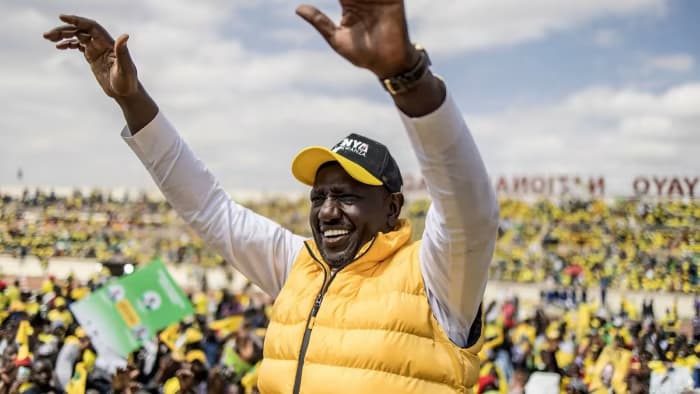We're loading the full news article for you. This includes the article content, images, author information, and related articles.
President Ruto’s administration faces deepening challenges, from economic hardship and tax backlash to a faltering ‘Hustler Nation’ narrative and growing political fractures—raising urgent questions about his government’s direction and 2027 prospects.

By Trully Kenyan Staff Writer
Nairobi, Kenya – President William Ruto ascended to power in 2022 on the back of a compelling grassroots slogan: The Hustler Nation. It was a populist, bottom-up campaign that resonated with millions of Kenyans who felt left behind by the trickle-down policies of successive regimes. Yet, three years into his presidency, the dream of the hustler economy is fading under the weight of economic turmoil, political discontent, and a crisis of public trust.
The core challenges now facing Ruto’s administration are no longer theoretical—they are lived experiences for Kenyans enduring a relentless cost-of-living crisis, controversial tax measures, and mounting debt obligations. And as the July 2025 protests have made painfully clear, the president’s social contract with the people is dangerously frayed.
The Kenyan economy is straining under the burden of rising external debt, an overstretched tax base, and surging inflation. The Finance Act—widely seen as emblematic of Ruto’s fiscal strategy—has provoked fierce backlash for loading more taxes on already struggling households and SMEs. VAT on essential goods, fuel levies, and proposed digital service taxes have not only eroded disposable income but also deepened the sense of betrayal among hustlers who once championed Ruto’s campaign.
Despite a GDP growth narrative touted by state officials, unemployment remains rampant—particularly among the youth, who make up over 70% of the population. “We were told to believe in bottom-up economics, but now we’re being squeezed from the bottom and the top,” said a boda boda rider in Embu.
Foreign lenders and institutions like the IMF and World Bank have praised Kenya’s fiscal discipline, but critics argue that these policies are extractive, benefitting technocrats over citizens. The administration’s dilemma is now one of perception versus reality: can macroeconomic reforms succeed when the social fabric is unraveling?
The hustler narrative was once Ruto’s most powerful political asset. It was emotional, symbolic, and pragmatic—an identity rooted in resilience, grit, and economic ambition. But with the lived realities of many Kenyans worsening, this message now rings hollow to growing segments of the public.
Public trust in the government has sharply declined. The youth-led July 7 protests, which reinterpreted the legacy of Saba Saba, carried signs mocking the slogan: “Hustler? Now we’re just hungry.” Civil society groups and political analysts warn that without recalibration, the narrative could become Ruto’s Achilles’ heel in the run-up to 2027.
What began as an aspirational creed is now being challenged by the unforgiving math of taxes, debt servicing, and widespread joblessness.
Ruto’s administration is also contending with growing internal dissent. Deputy President Rigathi Gachagua’s recent rhetorical divergence—emphasizing Mount Kenya’s “unity of purpose” and challenging the national power-sharing matrix—signals emerging fault lines within Kenya Kwanza. These rifts threaten to unravel the coalition’s fragile ethnic arithmetic, especially with regional kingpins beginning to reposition themselves for the next election cycle.
The president’s political capital, once abundant, is now being tested. Key allies are either retreating into regional strongholds or seeking to rebrand themselves amid rising unpopularity. Even Kenya Kwanza’s legislative muscle in Parliament is proving insufficient to quell the discontent brewing outside its walls.
Time remains, but barely. The administration is reportedly working on a stimulus package targeting SMEs and job creation, alongside attempts to restructure debt and boost manufacturing. But public patience is wearing thin.
To salvage the hustler vision, Ruto may need more than policy tweaks—he needs a political reset. One that listens, includes, and delivers tangibly. Without that, the legacy of the hustler presidency may be remembered not as the rise of the common man, but as a missed opportunity when hope collided with harsh reality.
Keep the conversation in one place—threads here stay linked to the story and in the forums.
Sign in to start a discussion
Start a conversation about this story and keep it linked here.
Other hot threads
E-sports and Gaming Community in Kenya
Active 9 months ago
The Role of Technology in Modern Agriculture (AgriTech)
Active 9 months ago
Popular Recreational Activities Across Counties
Active 9 months ago
Investing in Youth Sports Development Programs
Active 9 months ago
Key figures and persons of interest featured in this article